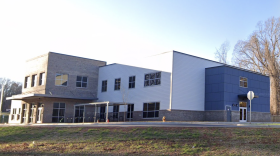Eight year-old MacKenzie Whistler had a rough start to her Christmas break. She had just found out that she would not be returning to her new school, Global Achievers School in Rocky Mount, this January.
ŌĆ£ItŌĆÖs hard to explain to a kid that the school is being shut down. Kids donŌĆÖt feel that adults would ever close a school,ŌĆØ said MacKenzieŌĆÖs mom Holly Whistler. ŌĆ£And then when it happens, you run out of words to talk to your kid about it.ŌĆØ
MacKenzie says when she found out her school was closing, all she wanted was to be left alone in her room. She loved her teacher, her new friends, and the schoolŌĆÖs focus on project-based learning. She would miss all of it.
Global Achievers School had just opened in August, and four months later the State Board of Education revoked the schoolŌĆÖs charter because it didnŌĆÖt have enough students.
Early Warning Signs
The new school had some problems right off the bat. Its initial enrollment of about 90 students was well below its projection. Then its building -- in Spring Hope -- didnŌĆÖt meet county code. The school relocated more than 20 miles away to Rocky Mount by the first day of school. Enrollment dropped again, down to 63 students by October, and continued to fall.
Alex Quigley is the chair of the stateŌĆÖs and the director of a charter school in Durham. The Board advises the State Board of Education, and recommends when charter schools should open or close. Quigley says that kind of loss of students is a bad sign.
ŌĆ£Because your budget is driven by enrollment, if youŌĆÖre having enrollment issues, youŌĆÖre probably having financial issues,ŌĆØ Quigley said.
That was the case at Global Achievers School. Quigley has been on the board that oversees North CarolinaŌĆÖs more than 180 charter schools for five years. He says a trifecta of academic issues, financial problems and government non-compliance are usually what cause charter schools to fail. Over time, North Carolina's Charter Schools Advisory Board has gotten better at predicting those failures based on a school's application to open. A found that the failure rate of schools that the Board approved to open decreased from 2011 to 2014.*
Quigley has seen a range of problems at struggling charter schools before, but this is the only time he can recall where a charter school didnŌĆÖt meet the stateŌĆÖs minimum enrollment of 80 students when it opened. The board voted to close the school because it did not meet that statute.
ŌĆ£We do not take these decisions lightly,ŌĆØ Quigley said. ŌĆ£I always leave the meetings just extremely stressed, because you know, youŌĆÖre talking about peopleŌĆÖs lives.ŌĆØ
Low Tolerance for Failure
The Whistlers are not diehard school choice advocates, but they appreciated having the option to send their daughter to a charter school. MacKenzie had previously attended her local public school, until new boundary lines put her out of that schoolŌĆÖs district. Given that MacKenzie couldnŌĆÖt continue there with her older sister, the Whistlers shopped around for a new school, and found Global Achievers School as it was just starting up.

MacKenzie and her parents started looking for another school after officials announced the closure. For this semester, they chose another charter school, North East Carolina Preparatory School.
ŌĆ£We were a little gun shy to try another charter school, but this oneŌĆÖs been around a while,ŌĆØ said Holly Whistler.
The Whistlers say moving MacKenzie into a new school again will certainly be a transition, but theyŌĆÖre most frustrated about what was lost when MacKenzieŌĆÖs school closed.
ŌĆ£It was very hard for us as parents because we like to be involved, and we had put a lot of sweat equity into the school,ŌĆØ said Holly.
By sweat equity, Holly means volunteering in the classroom, fundraising, and making calls to help save the school. She feels like all that -- plus tax money -- is gone. And because state funding for public schools is based on fall enrollment, the money to educate MacKenzie wonŌĆÖt follow her to her new charter school.
The Whistlers say they were left wondering why the oversight agency didnŌĆÖt give their school more time, more leeway?
Quigley, of the Charter Schools Advisory Board, believes when charter schools realize theyŌĆÖre not going to be successful, thereŌĆÖs a benefit to closing early.
ŌĆ£I actually think thatŌĆÖs usually better,ŌĆØ for students, Quigley said.
Data show that when a charter school has problems in its first three years, it usually continues to struggle over time, according to Quigley. This school had some early warning signs. The Charter Schools Advisory Board recommended last summer that the operator delay opening, but when the school found a new location quickly, it went ahead and opened.
ŌĆ£Someone has to say, ŌĆśLook you all are given autonomy, and thatŌĆÖs something that we want, but you have to be held accountable,ŌĆÖŌĆØ Quigley said. ŌĆ£Our board recognizes that there is low tolerance for failure in the charter school sector, and so we have to hold the bar.ŌĆØ
More Decisions Ahead For Charter School Advisory Board
Global Achievers School is the 15th charter school to have its charter revoked by the state since 1997. Another 33 have closed after opening to students, either because the schoolŌĆÖs operators relinquished their charter, or because the Charter Schools Advisory board and the State Board of Education chose not to renew a schoolŌĆÖs charter. The reasons are unique to each school, but include financial and academic issues and non-compliance with state regulations.
This year, the Board will consider 35 new applications to open potential charter schools.
ŌĆØCould we have done something differently? IŌĆÖm not sure,ŌĆØ Quigley said. ŌĆ£I know that IŌĆÖm going to go this year and be thinking ŌĆśOkay, how can I do a better job of evaluating everybodyŌĆÖs numbers?... What are the hard questions we need to ask? So that if we can prevent this in the future, we absolutely will.ŌĆØ
*The Fordham Institute is funded in part by the National Alliance for Public Charter Schools. For more information on the Institute's analysis of the NC Charter Schools Advisory Board's track record see p. 16 of .
Follow Liz Schlemmer on Twitter










